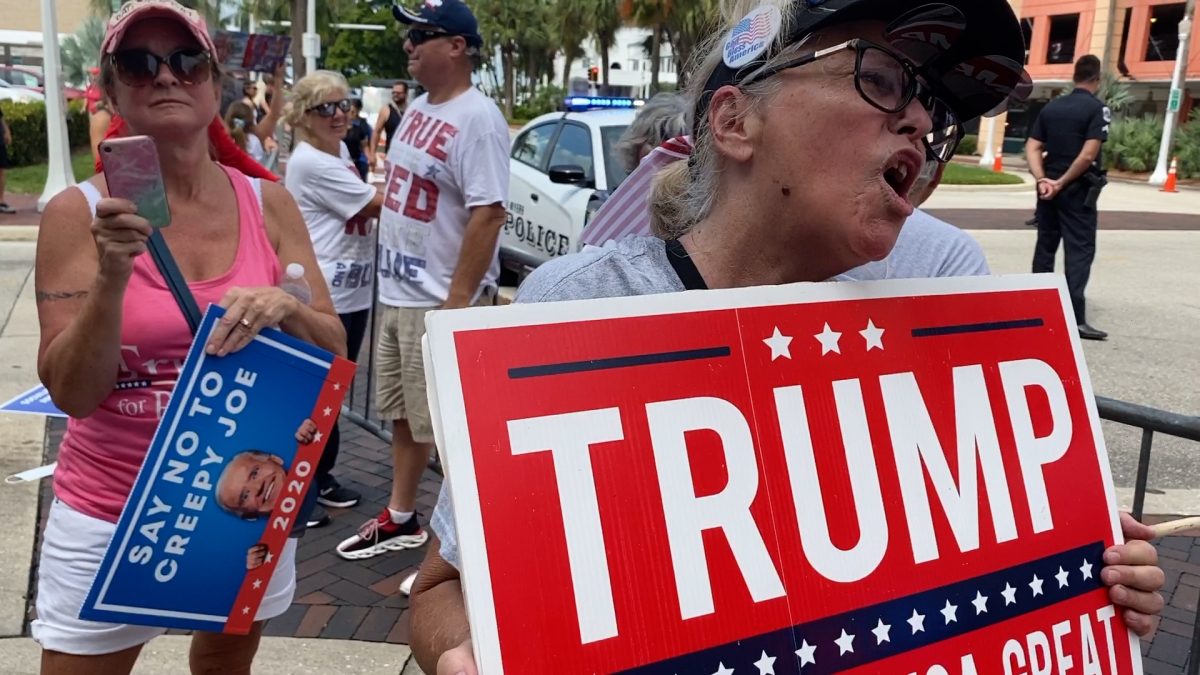On Friday, Trump came to town.
In the morning sun, as he walked past the Fort Myers Convention Center, a few early birds wearing Trump shirts, MAGA hats, and carrying US flags gathered at the corners near the Convention Center. They laughedand talked excitedly like football fans at a tailgate.
He walked along the river’s edge past parked security cars and clusters of police officers. It had been two weeks since his European friend of 25 years sent the email.
“You have seen (and so have they) the Mussolini moment on the balcony of the White House yesterday. What DON”T you SEE?! Do I have to constantly tell you about the German history that cost untold people (and writers like you) their lives? — Your former friend”
By the time he rounded the far edge of town and headed back, barricades and more people with Trump regalia blocked more streets. An older lady with a MAGA hat and thinning hair was mocking some Biden sign holders, “Gimme free stuff! Gimme free stuff!”
Trump’s caravan arrived late, a line of vehicles, large and small, weaving through streets like an army on the march.
A few minutes later, he and a friend watched as secret service agents came out the large double doors and invited some Trump flag wavers into the auditorium.
“This is one Trump event that is definitely not sold-out”, his friend said.
They watched three young women in masks with Biden signs being interviewed by a TV news crew. Suddenly four men crowded around the young women, jeering and waving “2020 Trump!” signs at the camera.
“We have to leave, now,” said his friend.
“Why?” he said. “No social distancing, no masks?”
“Because I’m about to hit one of them!” she said.
On Saturday, A Woman’s March came to town.
He had never done this before, attend a protest. Not through the Kent State shootings, Watergate, the 2000 election, 9/11, or the Women’s March of 2017.
But on this Saturday, he bought a Biden-Harris T-shirt, grabbed a Biden-Harris sign and joined hundreds of women lining the main thoroughfare into town for a two hour Woman’s March Call To Action.
They held Biden-Harris signs, along with “Black Lives Matter”, “The color of your skin should not put a target on your back”, “Let Felons vote”, “My Body My Choice”, “ERA now”, “Science Is Real!”.
People on Saturday errands drove by. Supporters honked. Detractors didn’t. He heard two drivers shout “Baby Killers!” One screamed “Fu^@k You!” Three yelled “Socialists!” But most Trump voters drove by in silence. Some pointed a thumb down, or a middle finger up. But the honks dominated the two hours.
Other than that, no Trump signs, not one, no MAGA hats, not one, no-one wrapped in the American flag, not one. No jeering. No bullying. No hissing or chest-thumping. Just a two mile line of women (and a few men) in masks, standing on the sidewalk socially distanced from each other, waving signs (mostly home-made) and chatting.
On Sunday he skipped politics.
He watched NFL games, the ones that hadn’t been canceled due to COVID19. He walked the dog, enjoying the return to quiet. He phoned his kids. He watched a movie on Netflix. He tried not to think about the pandemic, the 20,000 lies, the insults, assaulted women, alienated allies, racism, 23 million losing healthcare, 25 million unemployed, a highly partisan court system, …
“The only thing we have to fear, is fear itself”, Roosevelt had said.
He wondered.
On Monday, the first day of voting, he voted early.
The polling place was in a poorer area. His friend had chosen it for that reason.
They joined a line of brown, black, and white people, everyone in a mask. It was raining, but no-one complained. There was occasional gentle laughter. At the entrance to the building an old guy on a walker directed voter traffic and reminded people to socially distance.
“I like your handbag” his friend said to a woman who was dressed like she’d just come from church.
“You can get it at Macy’s or Dillards.” The two discussed the handbag’s compartments, then the weather – nothing about politics.
The voting booths were spread well apart in a large hall. The line worked its way past elderly poll workers, each of whom examined licenses and signatures and patiently answered even (his) dumb questions.
He got his ballot, filled in the right spaces, and pushed it through the scanner. It felt reassuring, calming, good.
